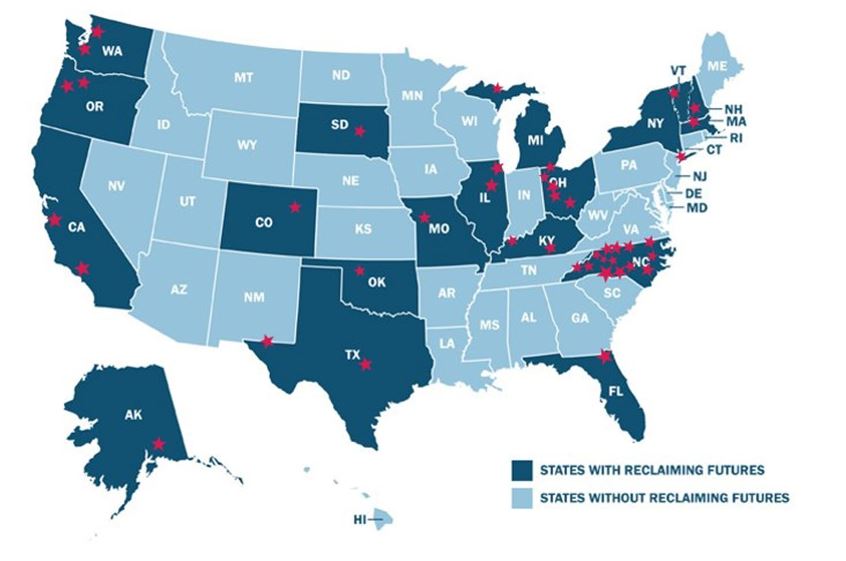 Reclaiming Futures has helped communities break the cycle of drugs, alcohol and crime for more than 10 years. But how exactly does Reclaiming Futures accomplish systems change? We sat down with National Executive Director Susan Richardson to discuss the model and benefits of becoming a Reclaiming Futures site.
Reclaiming Futures has helped communities break the cycle of drugs, alcohol and crime for more than 10 years. But how exactly does Reclaiming Futures accomplish systems change? We sat down with National Executive Director Susan Richardson to discuss the model and benefits of becoming a Reclaiming Futures site.
Lori Howell (LH): What makes Reclaiming Futures successful in a variety of communities across the country?
Susan J. Richardson (SJR): Reclaiming Futures offers powerful tools and resources to communities helping teens overcome drugs, alcohol and crime. We work to improve drug, alcohol and mental health treatment and connect teens to positive activities and caring adults.
LH: That sounds like quite a feat! How do you accomplish this?
SJR: Reclaiming Futures unites juvenile courts, probation, adolescent substance abuse treatment, teen mental health treatment and the community to reclaim youth.
LH: Please tell us about the Reclaiming Futures model.
SJR: The proven six-step Reclaiming Futures model unites juvenile courts, probation, adolescent substance abuse treatment, and the community to reclaim youth. Together this leadership team works for change to improve drug, alcohol and mental health treatment for teens and connect them to positive activities and caring adults.
LH: Please tell me more about the leadership team and how it functions.
SJR: The Reclaiming Futures Change Teams are organized into five groups: Judicial, Juvenile Justice, Substance Abuse Treatment, Community, and Project Director Fellowships. This change team also represents their local community at national Reclaiming Futures meetings. In addition to regular conference calls, each Fellowship has an annual meeting with their colleagues. Both the calls and meetings provide opportunities for Fellows to discuss implementation issues, professional topics, and seek the advice and support of colleagues as they work to implement the Reclaiming Futures model at the local level.


 erty such as homelessness, physical and sexual abuse, violence, witnessing shootings, unsafe school conditions, and familial behavioral health issues. Three Compton School district teachers are named for the prosecution alleging that their requests to provide youth with the appropriate behavioral health services were ignored by the district. For those of us that work in the juvenile justice or behavioral health fields these stories seem all too common. Decades of research and practice have shown that trauma has profound negative effects on an individual’s overall health (e.g., neurological, biological, psychological, social). One of the more well-known studies, which is being used to support this lawsuit, is the
erty such as homelessness, physical and sexual abuse, violence, witnessing shootings, unsafe school conditions, and familial behavioral health issues. Three Compton School district teachers are named for the prosecution alleging that their requests to provide youth with the appropriate behavioral health services were ignored by the district. For those of us that work in the juvenile justice or behavioral health fields these stories seem all too common. Decades of research and practice have shown that trauma has profound negative effects on an individual’s overall health (e.g., neurological, biological, psychological, social). One of the more well-known studies, which is being used to support this lawsuit, is the  Reclaiming Futures has helped communities break the cycle of drugs, alcohol and crime for more than 10 years. But how exactly does Reclaiming Futures accomplish systems change? We sat down with National Executive Director Susan Richardson to discuss the model and benefits of becoming a Reclaiming Futures site.
Reclaiming Futures has helped communities break the cycle of drugs, alcohol and crime for more than 10 years. But how exactly does Reclaiming Futures accomplish systems change? We sat down with National Executive Director Susan Richardson to discuss the model and benefits of becoming a Reclaiming Futures site.